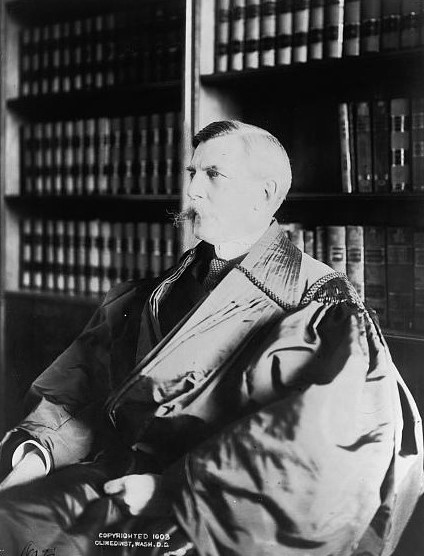- About MAA
- Membership
- MAA Publications
- Periodicals
- Blogs
- MAA Book Series
- MAA Press (an imprint of the AMS)
- MAA Notes
- MAA Reviews
- Mathematical Communication
- Information for Libraries
- Author Resources
- Advertise with MAA
- Meetings
- Competitions
- Programs
- Communities
- MAA Sections
- SIGMAA
- MAA Connect
- Students
- MAA Awards
- Awards Booklets
- Writing Awards
- Teaching Awards
- Service Awards
- Research Awards
- Lecture Awards
- Putnam Competition Individual and Team Winners
- D. E. Shaw Group AMC 8 Awards & Certificates
- Maryam Mirzakhani AMC 10 A Awards & Certificates
- Two Sigma AMC 10 B Awards & Certificates
- Jane Street AMC 12 A Awards & Certificates
- Akamai AMC 12 B Awards & Certificates
- High School Teachers
- News
You are here
Quotations in Context: Holmes
“Descartes commanded the future from his study
more than Napoleon from the throne.”
The statement above is often misattributed to American physician and author Oliver Wendell Holmes (1809–1894). It can instead be traced to the writings of his son, Oliver Wendell Holmes, Jr. (1841–1935), from a book published several years before the son’s appointment to the United States Supreme Court.

Photograph of Oliver Wendell Holmes, Jr., ca 1903. Public domain, Library of Congress.
In 1900, a revised English edition of Montesquieu’s The Spirit of the Laws was reprinted by the D. Appleton and Company publishing house in New York. This edition contained an introduction written by Oliver Wendell Holmes, Jr., who at that time was Chief Justice of the Massachusetts Supreme Judicial Court.

Engraving of Montesquieu. Public domain, New York Public Library.
The introduction began on a rather odd note by appearing to dismiss the importance and relevance of The Spirit of the Laws:
But the greatest works of intellect soon lose all but their historical significance. The science of one generation is refuted or outgeneralized by the science of the next; the philosophy of one century is taken up or transcended by the philosophy of a later one. . . . Montesquieu was a man of science and at the same time a man of the world. As a man of science he wrote an epoch-making book. And just because and in so far as his book was a work of science and epoch-making, it is as dead as the classics [Montesquieu 1900, pp. iii–iv].
Holmes did emphasize that The Spirit of the Laws contains enough wit to make it “fresh and pleasant reading” [Montesquieu 1900, p. iv] and that “one might read that work happily enough simply as literature” [Montesquieu 1900, p. v]. But to be truly appreciated as a work of genius, Holmes argued that the writings of Montesquieu should be read not by the young for instruction, but rather as “one of the last achievements of a studious life” [Montesquieu 1900, p. v].
After a short biography of Montesquieu, the introduction stated, “It would be out of place to offer an analysis of a book which is before the reader” [Montesquieu 1900, p. xiii], which was immediately followed by an analysis of the book before the reader. Montesquieu’s depiction of Rome was described as “fable uncritically accepted,” his “anthropology was anecdotic,” and his analysis of separation of powers in England as “a fiction invented by him” [Montesquieu 1900, p. xiii]. Having roundly condemned the actual content of the work, Holmes returned to praise by emphasizing the book’s importance to what came after it:
There is not space even to point out how many seeds it sowed. Montesquieu is a precursor, to repeat the word, in so many ways…His book had a dazzling success at the moment, and since then probably has done as much to remodel the world as any product of the eighteenth century, which burned so many forests and sowed so many fields [Montesquieu 1900, p. xiv].
It was at this point in the introduction that the subject of this column finally appears, although the actual quotation in the text is only peripherally about the mathematician René Descartes:
And this was the work of a lonely scholar sitting in a library. Like Descartes or Kant, he commanded the future from his study more than Napoleon from his throne [Montesquieu 1900, p. xiv].
It is not clear when or by whom Kant and Montesquieu were first excised, but the revised version that only mentions Descartes has proved extremely popular in collections of mathematical quotations. It is only in works focusing on the writings and career of Justice Holmes that the complete and accurate quotation still appears.
References
Montesquieu, Charles Louis de Secondat and Oliver Wendell Holmes, Jr. 1900. The Spirit of the Laws. Translated by Thomas Nugent. Edited by J. V. Prichard. Vol. 1. New York: D. Appleton and Company.
“Quotations in Context” is a regular column written by Michael Molinsky that has appeared in the CSHPM/SCHPM Bulletin of the Canadian Society for History and Philosophy of Mathematics since 2006 (this installment was first published in November 2010). In the modern world, quotations by mathematicians or about mathematics frequently appear in works written for a general audience, but often these quotations are provided without listing a primary source or providing any information about the surrounding context in which the quotation appeared. These columns provide interesting information on selected statements related to mathematics, but more importantly, the columns highlight the fact that students today can do the same legwork, using online databases of original sources to track down and examine quotations in their original context.
Michael Molinsky (University of Maine at Farmington), "Quotations in Context: Holmes," Convergence (April 2023)




